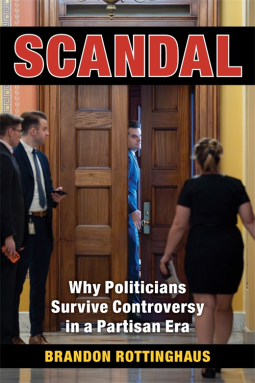Scandal
Why Politicians Survive Controversy in a Partisan Era
by Brandon Rottinghaus
You must sign in to see if this title is available for request. Sign In or Register Now
Send NetGalley books directly to your Kindle or Kindle app
1
To read on a Kindle or Kindle app, please add kindle@netgalley.com as an approved email address to receive files in your Amazon account. Click here for step-by-step instructions.
2
Also find your Kindle email address within your Amazon account, and enter it here.
Pub Date Nov 25 2025 | Archive Date Mar 04 2026
Talking about this book? Use #Scandal #NetGalley. More hashtag tips!
Description
Charting the changes from Watergate to the present, this book is a rigorous and compelling investigation of the politics of scandals. Bringing together wide-ranging survey data, innovative experiment design, and historical analysis, Brandon Rottinghaus demonstrates how political polarization, affective partisanship, fading trust in media, and the spread of misinformation have diminished the resonance of controversies. Although scandals still fell many politicians, there is a clear trend over time for fewer voters to be swayed by them. In a polarized world, scandals take only a modest toll on politicians’ approval ratings, survival in office, ambitions, and legacies. In many cases, partisans accept—or even embrace—misbehavior from members of their own party and revel in scandals affecting the opposing party. Challenging conventional wisdom with extensive data, this book illuminates the declining significance of scandals and the consequences for democratic accountability.
Advance Praise
"Rottinghaus tackles a complex, even explosive question: Why (and how) are some politicians able to survive scandals in this partisan age while others fall? He does so with clearheaded analysis, thorough and deep scrutiny, and a keen eye toward real-world politics. It’s a masterful job, well executed, by a major scholar who is at the top of his game. This may not be the final word on how politicians handle scandals, but it is clearly the best work we have to date."
--Michael A. Genovese, author of The Modern Presidency: Six Debates That Define the Institution
Available Editions
| EDITION | Other Format |
| ISBN | 9780231218825 |
| PRICE | $27.00 (USD) |
| PAGES | 208 |
Available on NetGalley
Average rating from 3 members
Readers who liked this book also liked:
Peter Meineck
Arts & Photography, History, Nonfiction (Adult)



















